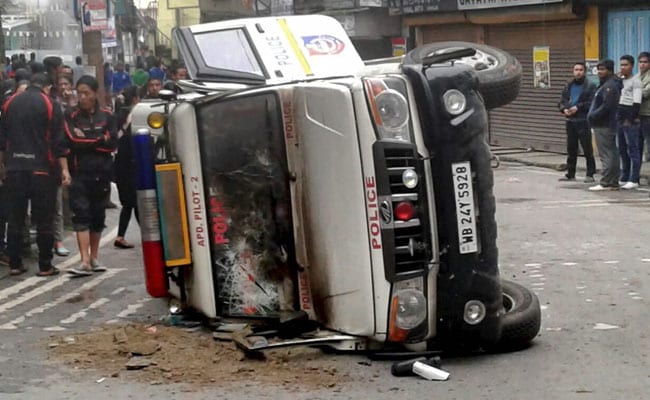
As fresh violence erupted in Darjeeling on Saturday, prompting the West Bengal government to call out the Army, Chief Minister Mamata Banerjee said she was ready for talks with protesting Gorkha leaders if they "eschew violence". The Gorkha Janmukti Morcha (GJM) - which has been spearheading protests - promptly rejected that offer, saying doors for talks with the state government are "closed forever". Three people have died in the violence since Friday. The Chief Minister also lashed out at the BJP, accusing it of conspiring with Gorkha leaders and "foreign forces" to keep the popular hill-town on a boil.
Here are the 10 developments in this story
Saturday's violent protests were triggered by the death of a 30-year-old man Yashi Bhutia. Locals allege he was shot dead by the police on Friday night in Sonada, 15 kilometres from Darjeeling.
Protesters came out on the streets, marching with Yashi Bhutia's body. They threw stones at the Sonada police station and faced police batons. Later, the Darjeeling Himayalan Railway toy train station was torched.
Ms Banerjee blamed the Centre for its "deliberate and total non-cooperation", saying that the Centre's refusal to send 10 companies of the Central Reserve Police Force (CRPF) - about 1,000 personnel - demanded by her government last month had led to the crisis.
The Union Home Ministry rejected the charge, saying 1,100 personnel including 100 women personnel had been deployed in Darjeeling. Besides, Home Ministry officials also asked why the state hadn't deployed its armed police instead of blaming the Centre.
While rejecting talks with the state government, the Gorkha Janmukti Morcha said they would only talk to the BJP-led government at the Centre.
Gorkha leaders have met Union Home Minister Rajnath Singh over the last month but the Home Ministry may not independently hold formal discussions on an issue relating to a state government.
Darjeeling has been simmering after Chief Minister Mamata Banerjee's Bengali-must policy. Morcha chief Bimal Gurung led the protests last month which soon snowballed into a demand for carving the hill areas into a separate state, to be called Gorkhaland.
Around 2,425 square km of Darjeeling district is governed by the Gorkhaland Territorial Administration (GTA), a partly-autonomous body created under a 2011 pact between the GJM, West Bengal government and the central government to give local residents the power to have their own local government.
The Morcha members in the body have already quit the GTA. Fresh elections are due in August but the Morcha says hill parties won't participate in the election.
Darjeeling had seen a violent movement for a separate Gorkhaland in the mid-1980s under Subhash Ghisingh. The movement ended with the establishment of a semi-autonomous administrative body in 1988 called Darjeeling Gorkha Hill Council.

